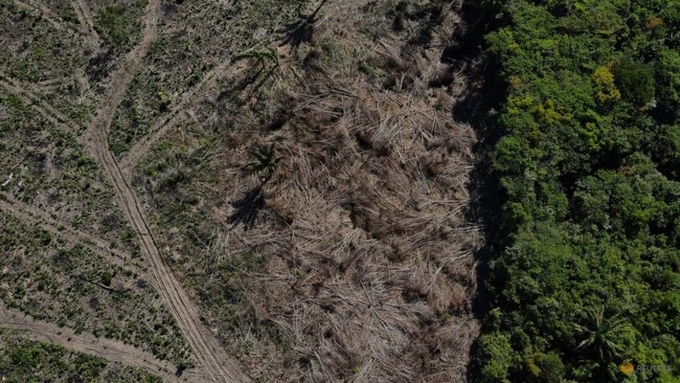June 8, 2025 | 18:49 GMT +7
June 8, 2025 | 18:49 GMT +7
Hotline: 0913.378.918
June 8, 2025 | 18:49 GMT +7
Hotline: 0913.378.918

An aerial view shows a deforested plot of the Amazon rainforest in Manaus, Amazonas State, Brazil July 8, 2022.
This "serious drop … tells us that nature is unravelling and the natural world is emptying", said Andrew Terry, director of conservation and policy at the Zoological Society of London (ZSL).
The World Wildlife Fund (WWF) report, which used 2018 data from ZSL on the status of 32,000 wildlife populations covering more than 5,000 species, found that population sizes had declined by 69 per cent on average. Deforestation, human exploitation, pollution and climate change were the biggest drivers of the loss.
Wildlife populations in Latin America and the Caribbean were hit especially hard, experiencing a 94 per cent drop in just five decades. One population of pink river dolphins in the Brazilian Amazon plummeted by 65 per cent between 1994 and 2016, the report said.
Its findings were broadly similar to those in WWF's last assessment in 2020, with wildlife population sizes continuing to decline at a rate of about 2.5 per cent per year, Terry said.
"Nature was in dire straits and it is still in dire straits," said Mark Wright, director of science at WWF-UK. "The war is definitely being lost."
DESPERATE NEED FOR SUPPORT
However, the report offered some glimmers of hope. While the eastern lowland gorilla population in the Democratic Republic of the Congo's Kahuzi-Biega National Park fell by 80 per cent between 1994 and 2019 due to bushmeat hunting, the mountain gorilla population near Virunga National Park increased from around 400 individuals in 2010 to over 600 by 2018.
Still, the wide-ranging declines have prompted desperate pleas for increased support for nature.
In December, delegates from around the world will gather in Montreal to hash out a new global strategy to protect the world's plants and animals.
One of the biggest asks is likely to be increased financing for global conservation efforts.
"We are calling on the rich nations to provide financial support to us to protect our nature," said Alice Ruhweza, WWF's regional director for Africa.
China needs up to US$17 trillion in additional investments for green infrastructure and technology in the power and transport sectors to reach net-zero emissions by 2060, a new World Bank report on China's climate and development challenges found.
The report, one of a new series of Country Climate and Development Reports, said China - the world's second-largest economy - would need private investment to cover the immense price tag and unleash the needed innovations.
Climate change poses a significant threat to China, especially its densely populated and economically critical low-lying coastal cities, and unabated climate change could cut its economic output by 0.5 per cent to 2.3 per cent as early as 2030, according to the report, which was released on Wednesday (Oct 12).
"China's long-term growth prospects are increasingly dependent on rebalancing the economy from infrastructure investment to innovation, from exports to domestic consumption, and from state-led to market-driven allocation of resources," said Manuela Ferro, the World Bank's vice president for East Asia and the Pacific.
It would also be impossible to reach global climate goals without China transitioning to a low-carbon economy, the report said, noting that China emits 27 per cent of global carbon dioxide and a third of the world's greenhouse gasses.
"This transition will require a massive shift in resources, innovation and new technologies to enhance energy efficiency and resource productivity," the report said.
At the same time, it said China could leverage existing advantages, including higher returns on the production of low-carbon technologies, a high domestic savings rate and a leadership position in green finance.
But it said private-sector participation was "crucial" to ensure China's path to carbon neutrality, and underscored the need for a more predictable regulatory environment and better access to markets and finance.
(Reuters)

(VAN) With the war ongoing, many Ukrainian farmers and rural farming families face limited access to their land due to mines and lack the financial resources to purchase needed agricultural inputs.

(VAN) Vikas Rambal has quietly built a $5 billion business empire in manufacturing, property and solar, and catapulted onto the Rich List.

(VAN) Available cropland now at less than five percent, according to latest geospatial assessment from FAO and UNOSAT.

(VAN) Alt Carbon has raised $12 million in a seed round as it plans to scale its carbon dioxide removal work in the South Asian nation.

(VAN) Attempts to bring down the price of the Japanese staple have had little effect amid a cost-of-living crisis.

(VAN) Fourth most important food crop in peril as Latin America and Caribbean suffer from slow-onset climate disaster.

(VAN) Shifting market dynamics and the noise around new legislation has propelled Trouw Nutrition’s research around early life nutrition in poultry. Today, it continues to be a key area of research.